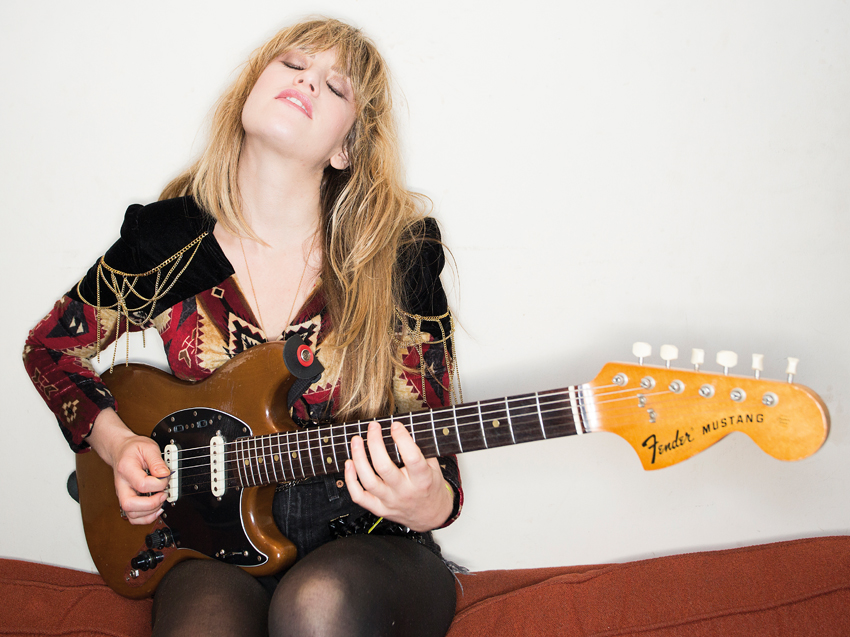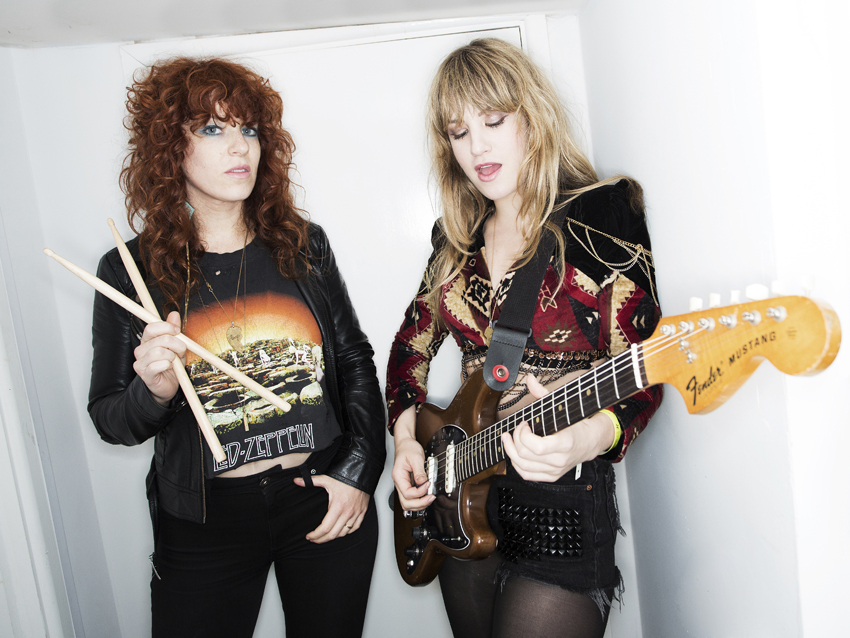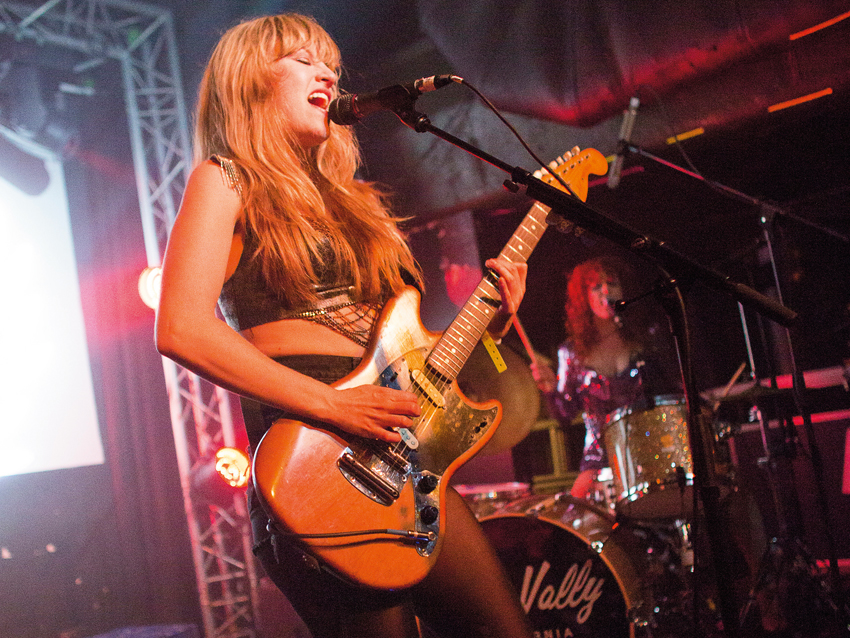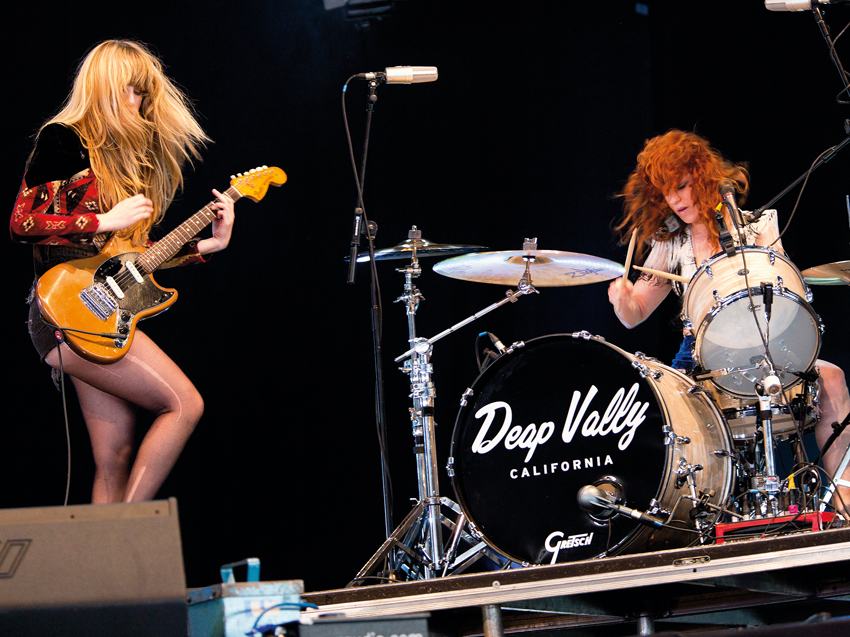Deap Vally's Lindsey Troy talks riffing and rhythm
LA's finest on debut album Sistrionix

Deap Vally's Lindsey Troy talks riffs and rocking
Lat year, LA duo Deap Vally were the latest buzz band to come out of LA, blessed with plenty of hype but yet to merit the rock press backslapping with any substantial material.
When we spoke to guitarist Lindsey Troy – just awoken from an in-car nap as she and drummer Julie Edwards travel from city to city as part of a non-stop touring schedule – things are a little different.
Backed by debut album Sistrionix, the band have been smashing head first through the summer’s major festivals – Glastonbury, T In The Park, Reading and Leeds, Lollapalooza and more – and they do so on the back of a truly crazy year.
“It’s been a real whirlwind,” Lindsey enthuses while slurping down a pick-me-up latte. “Playing with the Yeah Yeah Yeahs was totally incredible. We’re huge fans of theirs, so it really was a dream come true to play with them.” Just how the Californian guitarist came to realise such dreams is high on the agenda, as MusicRadar chats with the blues-rock revival’s latest stars...

Playing as a two piece
How much of your playing on Sistrionix was shaped and dictated by Deap Vally being a two-piece band?
“Working in the confines of a two-piece definitely affects my choices on guitar. I like that, it’s a nice challenge and it pushes me. Most of our songs aren’t chord based per se; they work around a mixture of chords and riffs or just riffs peppered with powerchords. It’s not your standard chord-based guitar rock.”
Have those confines improved you as a guitar player?
“It’s definitely made me much better. I can’t rely on a bass player so a lot of the time with the parts I write, I know guitar is going to be the only melodic instrument. Like when I solo I can’t rely on a rhythm guitar player so I have to keep that in mind to make sure I keep it very rhythmic.
"I have to make sure I mix chords with notes. But then Julie is a very dynamic drummer. She is very intuitive and creative and that helps. Her parts add so much. Being in a two-piece has definitely made me a more creative guitar player.”
Do you have to be mindful about filling the space left by not having a bassist?
“The empty space means that what you don’t put in there is as important as what you do put in. We’re very conscious of what we leave out of our music. Me having two amps [a Fender Bassman 1965 reissue and a Fender Deluxe] helps fill out the frequency range, so does me fuzzing out the guitar and using the distorted bass tones.
"Using two amps on stage instead of one makes a world of difference – I’m able to crank bass and guitar frequencies at the same time... and expedite my hearing loss. Julie’s drumming is very dynamic as well, which is really effective. The way I sing is big and boisterous, which definitely helps fill it out.”
You mentioned how playing guitar in a duo has made you more creative, but it also sounds like you’re not afraid to make simple parts count on Sistrionix...
“My style is very intuitive. I play by ear. I try not to be neurotic about my writing, I try to just let it flow. I had a few guitar lessons in my life but for the most part I am self-taught, so I just figured out how to do a lot of things by myself.
"When you figure out how to do vibrato or bend on your own it is in your own style a little bit. I’m not hung up on being technically correct. That doesn’t concern me. I like to just be as adventurous as possible. [With] some of my parts, I’m not afraid to play really simplistic riffs if they sound great – that doesn’t bother me.
“There was a time in my life when I was younger that I felt a lot of pressure when I was writing parts to make s**t sound really inventive and obscure. But I think I really got a breakthrough when I got to the point, musically, that I wasn’t afraid to play some real simple, catchy parts.”

In the studio
What gear were you using in the studio for the Sistrionix sessions?
“There was a little bit of mix and matching. I used my [1976 Fender] Mustang for the entire record. I played around with a few different pedals. The amp I used for most of the recording was a custom-built amp that [producer] Lars Stalfors had. That was really awesome.
"I like to keep my pedalboard pretty minimal in terms of consistency of our sound. I like to keep true to the minimalism of our band, at least for our first album. I think I’m going to buy a few more pedals now we have the first album under our belts. I’m singing and playing guitar at the same time so if I have too much beneath my feet then it can become really difficult because I have to keep looking down to see what I have to hit – so I try to keep it pretty minimal on my ’board.”
The closing track on the album, Six Feet Under, has a great swampy slide riff. It’s a bit of a departure from the rest of the record. Where did that come from?
“Six Feet Under was fun for me, because I played slide on that one. It is a bit of a departure from the rest of the album, and we really love that song, but it keeps true to the golden age of rock ’n’ roll that we love so much – Zeppelin had these really epic, longer experimental jams. And then all of my solos are all so much fun, they’re all my favourites – End Of The World, Bad For My Body...”
The album clocks in at under 40 minutes, with almost 10 of those made up of the closing track. Was keeping it lean and mean a conscious move?
“We’re not into filler. It was hard because we had so many songs and there were a lot that didn’t make it on the album. We didn’t want a long album – we wanted to keep it short.”
How much input did Lars Stalfors have in terms of finding your tone?
“We wanted to get the tone of the album to sound as close to the live sound as possible, which was surprisingly quite challenging. We’ve recorded with two other producers before working with Lars.
"The first thing we did with Lars was End Of The World and it was very clear very quickly that we should make our album with him because he really got it and he made it sound expansive. Lars was very hands-on in helping me get the right tones for the album. He had a lot of great ideas.”

Empowerment and Creeplife
Lyrically, you seem keen to tackle empowerment, like on Make My Own Money. Is that a fair comment?
“Empowerment is important to me. For me, music often plays that role. It’s feeding that need to feel empowered. The lyrics to that song are so simple – it just came right out. I’m pretty literal. Julie added the bit about having your own land. Well, she said ‘real estate’ but I changed it. We’d both love to buy a house, that’s a huge dream of ours.”
And how about Creeplife – was there a specific inspiration for that one?
“[Laughs] Yes, there was a particular inspiration for Creeplife. It was someone I was hanging out with when I was 17. We just like to call that type of person out. Especially in LA there’s a lot of that, these sleazy guys who prey on young women because young women are the only ones who are impressed by them. I wanted to call them out. Again, there’s a sense of empowerment to that song, too. It’s someone I feel I was kind of like, I guess. It’s a ‘f**k you’; it’s a middle finger.”
Do you think there is still a stigma out there for female guitarists to overcome, and how does this play against your ethos of empowerment?
“I’m sure there is a stigma. I feel very fortunate that we live right now with so many female guitar players. There are not as many shredding female lead guitar players as there should be in the public eye. I know there’s lots of female Led Zeppelin cover bands – which is awesome – and there are a lot of women out there, but as far as those making it into the public eye, there’s not a lot.
"But I’m happy to break through that glass ceiling. I feel like I’ve really been embraced by the music community. Everyone has been very kind and respectful to me. Very rarely do I ever feel patronised by other musicians. I think things are a lot better now then they used to be in the 90s.”
Sistrionix is available now from the official Deap Vally website. Connect with the band on Twitter or Facebook.
Rich is a teacher, one time Rhythm staff writer and experienced freelance journalist who has interviewed countless revered musicians, engineers, producers and stars for the our world-leading music making portfolio, including such titles as Rhythm, Total Guitar, Guitarist, Guitar World, and MusicRadar. His victims include such luminaries as Ice T, Mark Guilani and Jamie Oliver (the drumming one).


